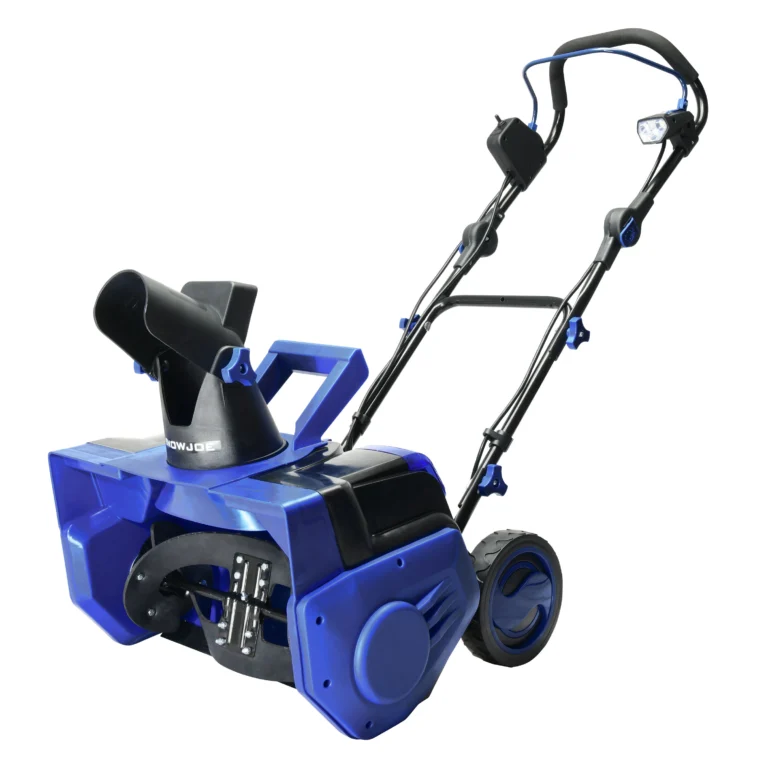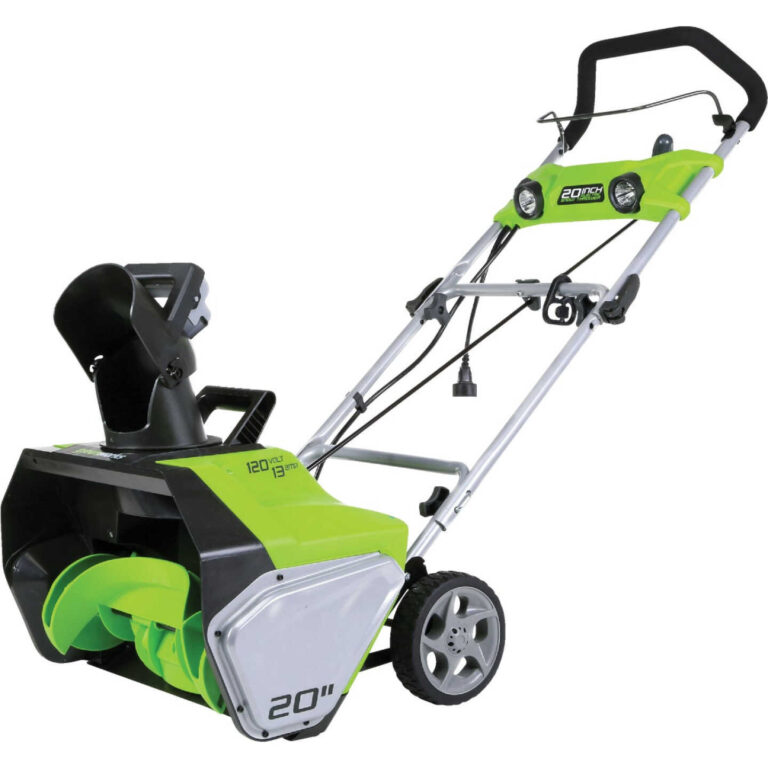Understanding the power requirements of an electric snow blower is crucial for ensuring optimal performance in varying snow conditions. Let’s explore the factors that determine the wattage of these machines and how it influences their efficiency.
Factors Affecting Electric Snow Blower Wattage
1. Snow Blower Size and Capacity
The size and clearing capacity of an electric snow blower play a significant role in determining its power needs. Larger and more powerful models designed for heavy-duty tasks will generally have higher wattage requirements. For example, a compact electric snow blower for light snowfall may have a power rating around 1000W, while a larger model suitable for heavier snow could range from 1500W to 2000W.
2. Voltage and Amperage
Electric snow blowers are typically designed to operate on standard household electrical systems. The power (in watts) can be calculated using the formula: Power (W) = Voltage (V) x Current (Amps). Most residential electric snow blowers operate on a standard 120V household circuit and draw varying amperages.
3. Snow Type and Density
The type of snow your region experiences also influences the required wattage. Light, fluffy snow generally requires less power to clear efficiently. In contrast, wet and heavy snow demands a more powerful electric snow blower to prevent clogging and ensure effective snow removal.
Choosing the Right Wattage for Your Needs
Residential Use: 1000W – 1500W
For typical residential use, where snowfall is moderate, an electric snow blower with a power rating between 1000W and 1500W should suffice. These machines are suitable for clearing driveways, sidewalks, and smaller areas without overloading your electrical circuits.
Heavy-Duty Tasks: 1500W – 2000W
In areas prone to heavier snowfall, especially wet and dense snow, opting for a more powerful electric snow blower in the range of 1500W to 2000W is advisable. This higher wattage ensures the machine can handle the increased demands of challenging snow conditions.
What You Need to Know Before Buying an Electric Snow Blower
Before making a purchase, consider the following factors to ensure you select the right electric snow blower for your specific needs:
1. Snowfall Patterns
Understand the typical snowfall patterns in your region. If you experience heavy and wet snow, a higher-wattage snow blower is recommended.
2. Clearing Area Size
Evaluate the size of the areas you need to clear. Larger driveways and pathways may benefit from a higher-wattage electric snow blower with increased clearing capacity.
3. Storage and Maneuverability
Electric snow blowers are generally more compact and easier to maneuver than their gas-powered counterparts. Consider your storage space and the ease of maneuvering the machine, especially if you have limited storage space.
How Much Does It Cost to Operate an Electric Snow Blower?
Understanding the operational costs of an electric snow blower is essential for budget-conscious consumers. Let’s explore the factors that contribute to the cost of operating these machines and how you can make informed decisions to manage expenses.
Operating Costs Breakdown
1. Electricity Rates
The primary cost associated with operating an electric snow blower is the electricity it consumes. Electricity rates vary by location and are typically measured in kilowatt-hours (kWh). To calculate the cost of operating your electric snow blower, you can use the formula: Cost = Power (kW) x Time (hours) x Electricity Rate (per kWh).
2. Power Consumption
The power consumption of an electric snow blower is measured in watts (W) and depends on factors such as the machine’s wattage, the snow conditions, and the duration of operation. Higher-wattage models may consume more power but can also clear snow more efficiently.
3. Frequency of Use
How frequently you use your electric snow blower throughout the winter season also impacts operating costs. If you live in an area with frequent snowfall, your operational expenses will naturally be higher than in regions with sporadic snow events.
Estimating Operating Costs
Example Calculation:
Let’s consider an electric snow blower with a power rating of 1500W operating for one hour:
Cost = (1500W / 1000) x 1 hour x Electricity Rate (per kWh)
This formula converts the wattage to kilowatts and multiplies it by the operating time to determine the energy consumption in kilowatt-hours.
Tips to Manage Operating Costs
1. Choose an Energy-Efficient Model
When purchasing an electric snow blower, consider models with energy-efficient features. Some machines are designed to optimize power usage, providing effective snow removal while minimizing energy consumption.
2. Operate During Off-Peak Hours
Electricity rates often vary based on the time of day. Operating your snow blower during off-peak hours, when electricity rates are lower, can help reduce overall operating costs.
3. Regular Maintenance
Keep your electric snow blower well-maintained to ensure optimal performance. A well-maintained machine operates more efficiently, potentially reducing the time it needs to clear snow and consequently lowering energy consumption.
Does an Electric Snow Blower Have More Torque Than Gas?
Torque is a measure of rotational force, and it plays a crucial role in the performance of snow blowers. Let’s explore whether electric snow blowers have more torque than their gas-powered counterparts.
Torque in Gas-Powered Snow Blowers
Gas-powered snow blowers are known for their high torque, which is essential for effectively throwing snow over long distances. The combustion engines in these machines generate substantial rotational force, making them well-suited for heavy-duty tasks and challenging snow conditions.
Torque in Electric Snow Blowers
While electric snow blowers may not match the raw torque of gas-powered models, they still offer sufficient rotational force for residential snow removal. Electric motors can deliver consistent torque, and advancements in technology have led to improved performance in newer electric models.
Recap and Quick Reference Guide for Electric Snow Blower Buyers
In this comprehensive guide, we’ve explored the differences between gas and electric snow blowers, focusing on the power aspect of electric models. Before making a purchase, it’s crucial to consider several factors to ensure you select the right electric snow blower for your specific needs. Let’s recap the key points and provide a quick reference guide for potential buyers.
Differences Between Gas and Electric Snow Blowers
Gas-Powered Snow Blowers
- Power Output: Measured in horsepower (HP), gas models are known for their robust performance.
- Throw Distance: Gas-powered blowers can throw snow over a considerable distance, making them suitable for larger areas.
Electric-Powered Snow Blowers
- Power Output: Measured in watts (W), electric models are generally more compact and environmentally friendly.
- Throw Distance: While not as far-reaching as gas blowers, electric models offer sufficient throw distance for residential use.
Do Electric Snow Blowers Have Enough Power?
- Residential Use: Electric snow blowers with 1000W to 1500W are generally sufficient for moderate snowfall.
- Consideration for Snow Density: Higher wattage may be needed for areas with heavy, wet snow to prevent clogging.
How Many Watts Does an Electric Snow Blower Use?
- Factors Affecting Wattage: Snow blower size, voltage, amperage, and snow type influence the required wattage.
- Choosing the Right Wattage: Residential use typically requires 1000W to 1500W, while heavy-duty tasks may need 1500W to 2000W.
How Much Does It Cost to Operate an Electric Snow Blower?
- Operating Costs Breakdown: Consider electricity rates, power consumption, and frequency of use.
- Estimating Operating Costs: Use the formula (Power (kW) x Time (hours) x Electricity Rate) to calculate costs.
- Tips to Manage Costs: Choose energy-efficient models, operate during off-peak hours, and perform regular maintenance.
Does an Electric Snow Blower Have More Torque Than Gas?
- Torque in Gas-Powered Models: Gas blowers are known for high torque, crucial for heavy-duty tasks.
- Torque in Electric Models: Electric blowers, while not matching raw torque, offer sufficient rotational force for residential use.
Final Considerations
When deciding on an electric snow blower, weigh factors such as snowfall patterns, clearing area size, and storage and maneuverability. Selecting the right machine with the appropriate wattage, features, and considerations can make winter snow removal a more efficient and cost-effective task.
As you embark on choosing the ideal electric snow blower for your needs, use this guide as a reference to make an informed decision. Whether it’s for residential use or tackling heavy snow, finding the right balance of power and efficiency will ensure you’re well-equipped to face winter’s challenges.




